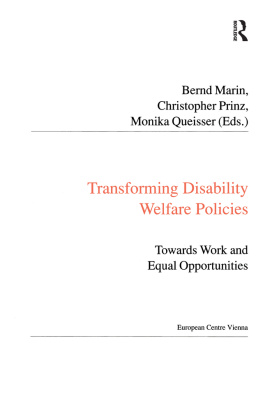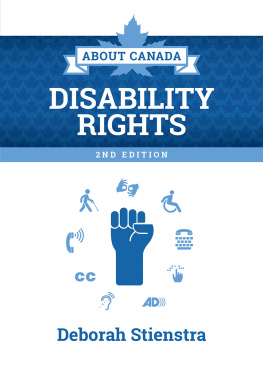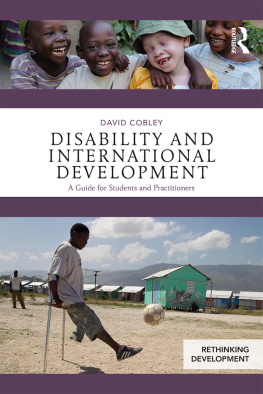Transforming Disability Welfare Policies
Public Policy and Social Welfare
A Series Edited by the European Centre
European Centre Vienna
Volume 29
Bernd Marin, Christopher Prinz, Monika Queisser (Eds.)
Transforming Disability Welfare Policies
Towards Work and Equal Opportunities
First published 2004 by Ashgate Publishing
Published 2017 by Routledge
2 Park Square, Milton Park, Abingdon, Oxon, OX14 4RN
711 Third Avenue, New York, NY 10017, USA
Routledge is an imprint of the Taylor & Francis Group, an informa business
Copyright European Centre Vienna, 2004
All rights reserved. No part of this book may be reprinted or reproduced or utilised in any form or by any electronic, mechanical, or other means, now known or hereafter invented, including photocopying and recording, or in any information storage or retrieval system, without permission in writing from the publishers.
Notice:
Product or corporate names may be trademarks or registered trademarks, and are used only for identification and explanation without intent to infringe.
This publication was sponsored by
the Austrian Federal Ministry for Social Security, Generations and Consumer Protection
Copy-editing and DTP: Willem Stamatiou
European Centre for Social Welfare Policy and Research
Berggasse 17,1090 Vienna, Austria
British Library Cataloguing-in-Publication Data. A catalogue record for this book is available from the British Library.
ISBN 13: 978-0-7546-4284-8 (pbk)
Publisher's Note
The publisher has gone to great lengths to ensure the quality of this book but points out that some imperfections from the original may be apparent.
Contents
Bernd Marin, Christopher Prinz, Monika Queisser
INTRODUCTION:
1. MAIN FINDINGS AND CONCLUSIONS FROM THE OECD REPORT AND CRITICAL QUERIES
OECD
Transforming Disability into Ability.
A Commentary Based on Recent European Research
Deborah Mabbett
Berglind sgeirsdttir
W. Roy Grizzard
Jean-Yves Hocquet
Adle D. Furrie
Irene Hoskins
Vladimir Kosic
Steen Bengtsson
Joakim Palme
Peter Scherer
Colin Barnes
Philip R. de Jong
Kenneth S. Apfel
Stanislazva Golinowska
Chiara Saraceno
Philip R. de Jong
Hedva Sarfati
Rebecca Endean
Erik Samoy
Jan Rydh
Charlotte Strmpel
Vappu Taipale
Hedva Sarfati
Dennis J. Snower
Emily S. Andrews
David Kalisch
Jan Rydh
Raymond Wagener
Harold L. Wilensky
Christoph M. Schmidt
Philippe Askenazy
What Should and What Can Employers Do?
A German Government Perspective
Hartmut Haines
Richard V. Burkhauser and David C. Stapleton
Bjrn Hvinden
Rick van der Ploeg
Stefan Trmel
Luis Cayo Prez Bueno
Mikael Klein
David Morris
Agns Roche de la Porte des Vaux
RELATED OECD / EUROPEAN CENTRE PUBLICATIONS
Guide
On the occasion of "The European Year of People with Disabilities 2003", the OECD and the European Centre for Social Welfare Policy and Research organised an international conference at the United Nations Office in Vienna on "Transforming Disability into Ability". The conference addressed key challenges in disability policy for the working-age population, and discussed policy recommendations as outlined in the recent OECD report on disability policies (OECD, 2003). Particular emphasis was laid on the implementation and 0practical aspects of the report's conclusions. Participants represented various social science disciplines, such as economics, law, public health and (rehabilitation) medicine, and a wide variety of institutions. Policy-makers, administrators, legislators, and representatives from the disabled people's movement exchanged views with the common goal of improving disability policies in their countries.
The discussions were broadly structured along the report's main policy conclusions with panels and discussions focusing on the following six questions:
- What do we mean by "being disabled"?
- What rights and responsibilities for society and for persons with disabilities?
- Who needs activation, how, and when?
- How should disability benefits be structured?
- What should and what can employers do?
- Which barriers to participation exist?
This book follows the structure of the conference. The preface gives a brief overview of the conference debates by presenting summaries of the panel discussions. The volume continues with an introduction summarising the main policy conclusions of the 2003 OECD report "Transforming Disability into Ability", followed by the opening statements of the conference. The proceedings of each panel are introduced with a short presentation of the respective theme outlining the OECD's policy conclusions in this particular area. The conference speakers and contributors are presented with short biographies at the end of this volume.
The first session focussed on disability definitions. The definition and use of the term "disability", both in the context of the OECD report and in more general terms, is crucial for the discussion of disability policies. As policies evolve, definitions change to reflect changes in community attitudes towards disability. In recent years, the medical model of disability, which sees disability as a characteristic of the individual, has been replaced by a socio-environmental model, which regards disability as an attribute resulting from the interaction between the individual and the social and physical environment. This interpretation is reflected in the WHO's new International Classification of Functioning and Disability (ICF).
This definition of disability, however, is neither universal nor are there common measurement instruments. Consequently, comparative statistics on the prevalence of disability are not readily available. The OECD report that formed the basis for this conference (OECD, 2003) mainly uses measures of self-reported disability. People are classified as disabled if they have a long-term or chronic physical or mental health problem, illness or disability and if they are moderately or severely hampered in their daily activities by this problem. This corresponds to "functional limitation or disability caused by a chronic or long-term impairment" (in the ICF this constitutes the second layer). These subjective measures of disability are derived from national population surveys providing information on disability status, but also on respondents' employment and income status.
The aim of the OECD project was to measure the impact of income replacement and employment policies (some of the "environmental factors" used in ICF) on the extent to which disabilities translate into disadvantage in terms of employment and economic well-being ("activities and participation" in ICF). To measure the impact of policy, a second type of data is used: Administrative statistics on beneficiaries of disability benefitsvealing, since a large divergence between self-assessed and administrative disability prevalence points to major challenges for policy-makers.










